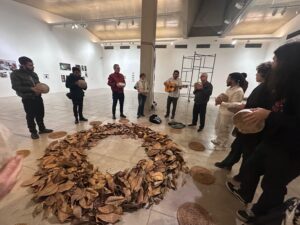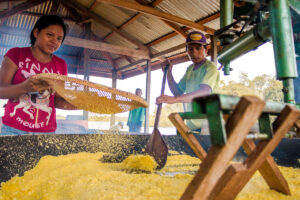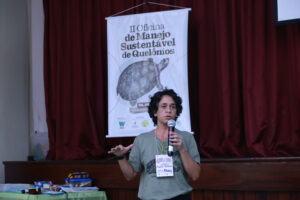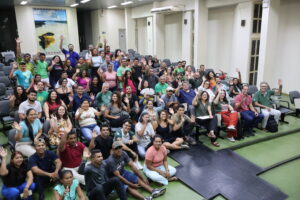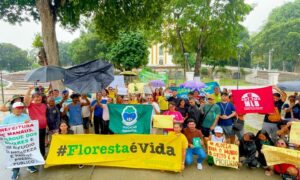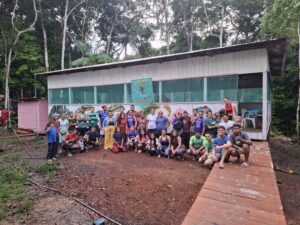By Maria Julia Ferreira and Maria Cunha
Translated by Laiane Lessa
Between February 20ᵗʰ and 22ⁿᵈ, the first meeting to discuss the oilseed production chain was held in Bauana community (Carauari – Amazon). The event was organized by Chico Mendes Memorial, with the support of partner organizations. Institutes, communitarian leaders and over 100 traditional seed harvesters attended the event.
The oilseed production chain plays a crucial role in addressing this topic to raise awareness about its relevance. By discussing this chain, we can better comprehend the environmental and social impact associated with it and its potential for a sustainable economy integrated within local communities in the Mid-Juruá region. This first meeting was important for those who support it and for those who believe in the seed’s power, which provides a better quality of life for their families living in and from the forest.
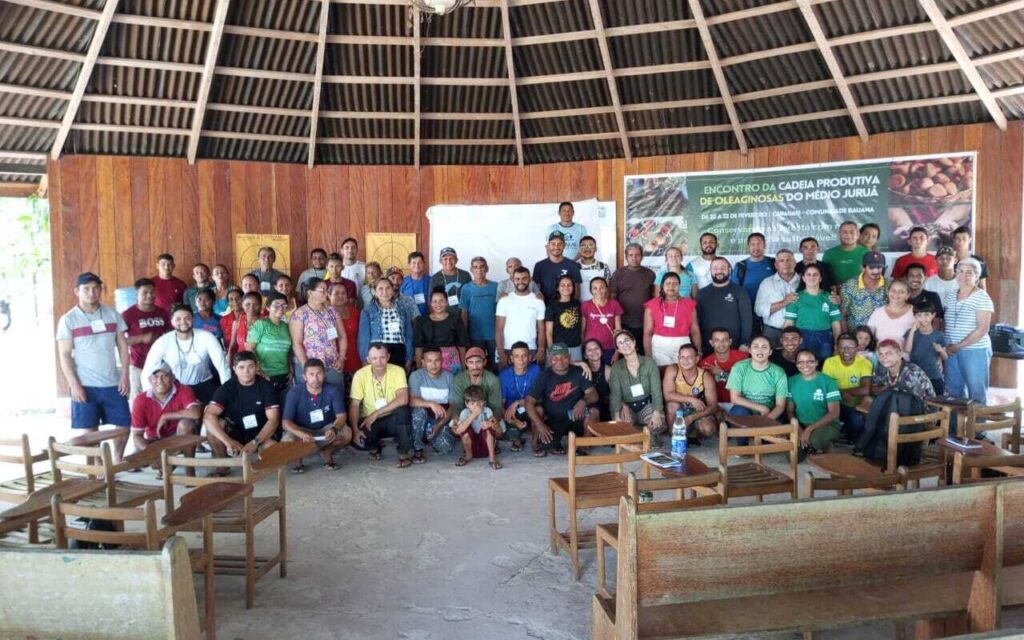
On the first day of the meeting, a timeline was created about seed harvesting in the Mid-Juruá region. During the activity, the leadership highlighted key points for the beginning of this production chain in the region, such as a research project carried out in the territory in the early 2000s. The project aimed at the production and use of andiroba oil as biodiesel to generate electricity. The oil festival made it clear that such an initiative wasn’t economically viable, due to hundreds of liters of oil needed to generate energy for the event’s 14 hours of duration. Following this, selling the oil to Natura, a multinational company, became an alternative form of commercializing the product.
Over the years, Mixed Cooperative for Sustainable Development and Solidarity Economy in Mid-Juruá (CODAEMJ) and Association of Agroextractivist Residents of the Uacari Sustainable Development Reserve (AMARU) were created. The harvest and sale of oilseeds — andiroba (Carapa guianensis), murumuru (Astrocaryum murumuru) and ucuuba (Virola surinamensis) — have become one of the main economic activities for the Mid-Juruá residents. This historical reconstruction was mediated by community leaders recognized for their prominence in productive activity for over two decades.
On the second day of the meeting, the participants collectively listed the obstacles of the productive chain, differentiating them by the production process: 1) strategic planning; 2) pre-harvest monitoring trip; 3) contract between grassroots organizations and the company; 4) contract between grassroots organizations and harvesters; 5) harvest; 6) pre-processing done in communities; 7) transportation to industries; 8) processing in industries; 9) chemical analysis; 10) transportation of the final product to the company.
The problems mentioned in the event were mainly related to: the struggle to achieve high-quality oil; the need to enhance the industry infrastructure; the time spent between stages of the production process; the challenge to increase working capital; and the need to improve the grassroots management.
On the same day, institutions and organizations presented possibilities for supporting oilseed activities and some ongoing projects within this productive chain. At this moment, Instituto Juruá presented its ongoing research project, initiated in 2023. The project aimed to gather robust data about the ecological, social and economic impacts of oilseed harvesting in the territory. In addition, Instituto Juruá’s team indicated the desire to support other related demands to strengthen this traditional activity in Mid-Juruá.

Finally, on the third day, the meeting participants were divided into groups to classify the obstacles in priority order. At this moment, actions were discussed to solve or alleviate some of the challenges listed. Thus, strengthening the oilseed productive chain in Mid-Juruá is due to the importance of these seeds, which goes beyond the economic aspect. They are intrinsically linked to cultural identity and habits of these communities, maintaining traditions and practices that are rooted in history and local knowledge. By recognizing the central role of seeds in the lives of extractivists, we can contribute to promote social justice, strengthen family farming and preserve the forests.
Considering this, the importance of discussing the demands of the productive chain became clear. Therefore, it was agreed that, from now on, this meeting will be held annually, aiming to strengthen ties between oilseed-harvesting communities and further consolidate this productive activity crucial for the territory.

